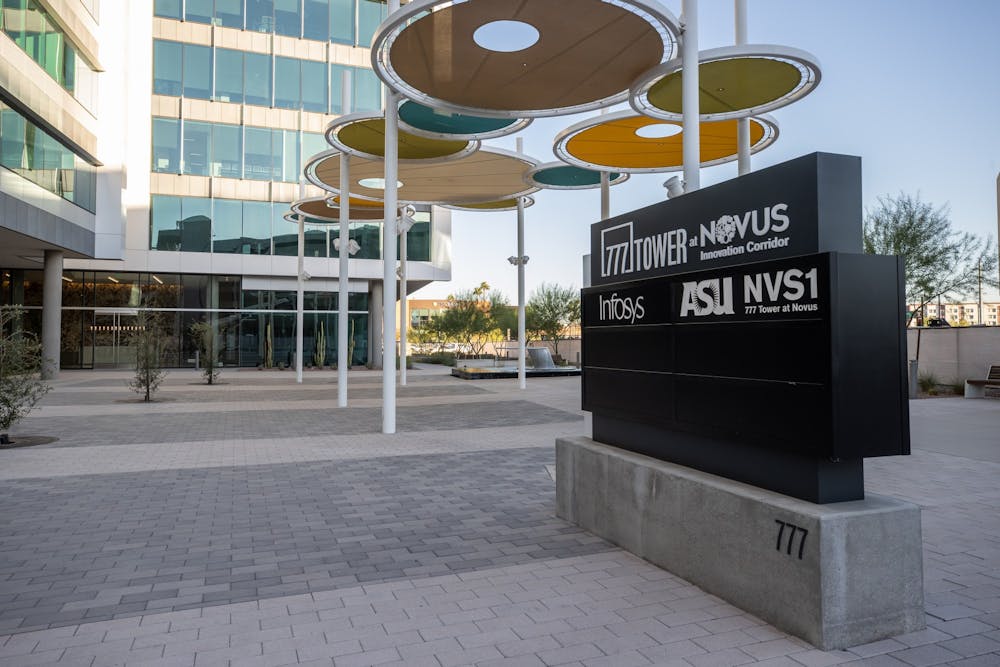Catellus Development Corporation, the partner developing Novus Innovation Corridor with ASU, has completed an office building, hotel, parking structure and apartment building since beginning its third phase of the project.
Novus Innovation Corridor, the marketing name ASU President Michael Crow created, is 355 acres of University-owned land adjacent to ASU's Tempe campus, said Charley Freericks, senior vice president of Catellus, and Erin McKenna, Novus Innovation Corridor marketing manager.
The project is in its third phase but will take about 20 years to develop.
Private developers pay a rate equivalent to property taxes after they have enter into a ground lease, allowing them to develop on the University's property; this funds expansion and maintenance of athletic venues, said Jay Donnelly, vice president of University real estate.
These funds helped renovate Sun Devil Stadium and build the Mullett Arena, which opened with a Sun Devil hockey victory on Oct. 14.
Novus is one of seven innovation zones at ASU. The purpose of the zone is to create a place where the private sector can interact with ASU's knowledge assets, and create opportunities for students and faculty to collaborate with the private sector.
Once completed, Novus will encompass over 10 million square feet with office space, hotel rooms, residential living, and retail, restaurants and entertainment.
"We are really building a city," Donnelly said. "I always think of Novus as a city within a city because of its location in Tempe."
An economic impact report by ASU's Seidman Research Institute projects that by 2035, Novus will add 34,000 jobs through office, hotel, multifamily and retail operations, McKenna said in an email.
777 Tower office space
A 160,000-square-foot office building was completed in July 2020, approaching 500 to 600 employees, with 8,000 square feet of retail space on the ground floor, Freericks said.
The space is used by some ASU facilities and Infosys, a global technology consulting company. Infosys has done joint research with ASU's computer science and engineering program, Donnelly said.
Residential living and hotel spaces
The Piedmont apartments were built by developer Aspen Heights with the units becoming available at the end of 2021. It contains 318 apartments not intended for ASU students, Freericks and McKenna said.
"It's meant for the young professional that perhaps works in this office building and has graduated from ASU and still wants to stay close to campus," Donnelly said.
In about a year, another apartment building will be completed. These apartments will be microunits intended for single residents, with custom Italian furniture.
Novus Innovation Corridor has 4,100 apartment units proposed in total, but this will be adjusted up and down as the development continues. Novus apartments are not geared toward ASU students.
The dual-branded Hyatt Place and Hyatt House Hotel was completed in August 2020 and contains 259 rooms, with Hyatt House intended for an extended stay.
More to come
An entertainment district called Novus Place is under construction now, with the newly constructed footbridge running over University Drive connecting it to the Valley Metro light rail.
A creative office space, on the southeast corner of Rio Salado Parkway and Dorsey Lane, developed by Wentworth Property Company with three, three-story buildings and a parking structure for them is under construction now.
A space between Rio Salado Parkway and Third Street is intended to be a medical office space.
Retail shops and restaurants will be leased on the ground floor of most office and apartment buildings.
"Hopefully, a year from now, we will have a long list of restaurants and shops to talk about," Freericks said.
Sustainable practices
Novus is rated LEED ND (neighborhood development) Gold, which is the premier rating service for sustainability and development.
Catellus requires all of its builders to meet LEED Certified standards, all of the buildings have sustainable glass and sustainable heating, ventilation and cooling systems, Freericks said.
The Rob and Melani Walton Center for Planetary Health building completed in 2021, part of the Novus Innovation Corridor, has a low carbon footprint, as it rejects heat with the tan-colored material on the outside.
READ MORE: Walton Center for Planetary Health opens with goal of innovative sustainability
"We are very thoughtful in making sure that we are creating an environment that works not only from an economic perspective but also a livability perspective," Donnelly said. "We want this to be viewed as a premier location that is an asset both financially and as a business attraction tool that allows ASU to expand and continue its educational mission."
With construction, Catellus has tried to limit traffic by not taking dirt from Novus and transporting it somewhere else. It reuses materials that come off sites from the old facilities that are torn down to make room for the new developments.
Edited by Jasmine Kabiri, David Rodish, Piper Hansen and Grace Copperthite.
Reach the reporter at abickle@asu.edu and follow @AlyssaBickle1 on Twitter.
Like The State Press on Facebook and follow @statepress on Twitter.

Alyssa Bickle is a staff reporter, writing for the community and culture desk. She is a writing tutor for University Academic Success Programs, and a fellow in the Center for the Study of Religion and Conflict. She is pursuing bachelors degrees in journalism and political science.




